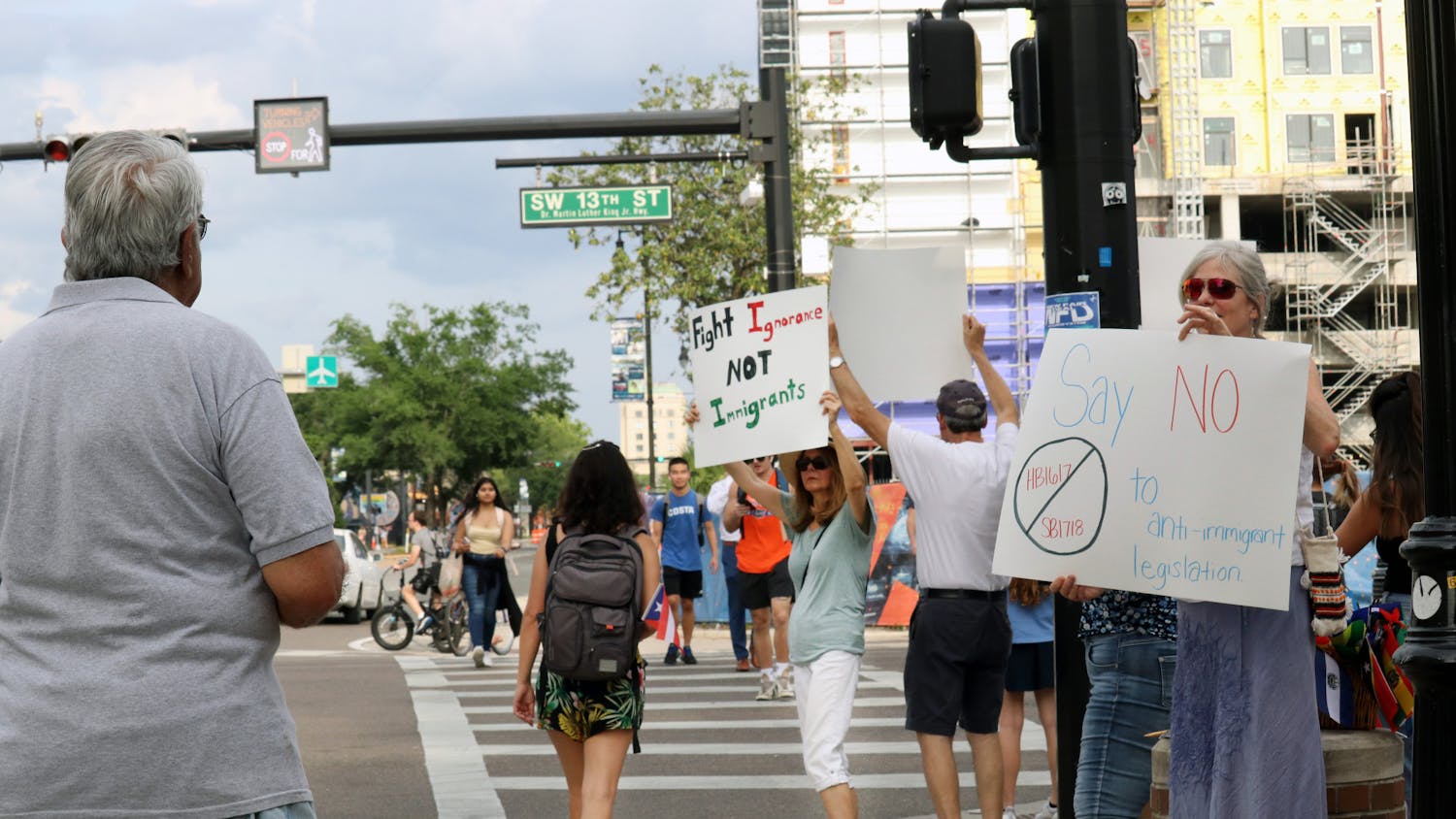With signs held high and voices raised, students all across Florida are taking back their education.
At noon Friday, students at UF, P.K. Yonge Developmental Research School and Eastside High School walked out of their classes to protest what they feel is government censorship in education.
They were just a few out of more than 300 universities and high schools all over Florida that participated. The state-wide walkout was organized by Walk Out 2 Learn, a nonprofit organization dedicated to fighting for student rights across Florida.
The organization was created and founded by Zander Moricz, 19. Originally from Sarasota, Moricz escaped to Harvard to study social studies and education.
However, when he realized how great the disparity was between Florida’s education system and other states, he returned to Florida to fight for a better education.
“Walk Out 2 Learn is an acknowledgement of the fact that right now Floridians do not have control over their legislature—their governor does,” Moricz said.
At UF, about 50 students gathered in the Plaza of the Americas to acknowledge just that. While there, they held signs and cheered while listening to a speech from Joaquin Rafaele Cecilia Marcelino, an 18-year-old UF biochemistry and political science freshman, about the importance of diverse education.
Each person had their own reasons to join the cause.
As a member of the LGBTQ community, the government’s ban on the instruction of gender identity and sexual orientation is very concerning for Marcelino. Walk Out 2 Learn is an opportunity to speak out.
“You're not going to erase us from what you think is inappropriate. Because we're here and we exist and we're never going to stop existing,” said Marcelino. “We've existed throughout time and we'll keep existing.”
Several other members of the LGBTQ community were at the walkout.
Savannah Beaulieu, 19-year-old UF botany freshman, saw posters about the walkout around campus and felt drawn to the cause.
“I've been feeling really helpless and upset about everything that's been going on in our legislature and the way our legislature is taking our rights away from us,” she said, “and I wanted to do something about it.”
As a gay woman, she knew she would be treated differently. She’s using this walkout as a platform to address state legislators and make sure they are doing their part in protecting those that need it, she said.
“The kids are watching, and we don't want this anymore,” Beaulieu said. “You do better or we're going to do better for you.”
Another student, Amanda Hiatt, a 19-year-old UF women’s studies and political science freshman. As a woman studying women’s history, she sees the impact newly passed legislation has on the entire education system.
Just because someone is not a women’s studies major or a political science major, it doesn’t mean HB 999, book bans or the “Don’t Say Gay” bill won't affect them, she said.
“The ban isn't just talking about things integral to women's studies. It's talking about intersectionality, which is a concept integral to absolutely every topic here on campus,” she said. “It's ingrained in everything we learn.”
Hiatt is concerned about the effects HB 999 could have on her education if it passes into law. Currently, the bill is still in committee hearings.
She almost considered leaving UF and leaving Florida due to the censorship coming from the legislature.
Though Hiatt hasn’t given up on Florida’s education system, Kaya Hill, a 22-year-old Gainesville resident, did.
She came to Gainesville as a prospective graduate student hoping to study intercultural communication. However, upon arriving in Florida from Indiana, she realized the education system wasn’t as great as she expected.
She believes the government’s overreach is dangerous. Suicide, depression and anxiety rates are at an all time high, she said, and this educational censorship will only make it worse.
“So many people feel unsafe to participate in conversations,” she said. “That's kind of what America is supposed to be about. We were supposed to be a melting pot of different ideas. But we're not, and so this legislation, it's more than just a cause for concern. It is a cause to rally.”
Students at P.K. Yonge also gathered outside classrooms to listen to speakers and hold up signs. Like UF students, the highschoolers who participated felt a personal connection to the government’s attack on marginalized communities.
Meghana Mandalapu, an 18-year-old senior at P.K. Yonge, said she felt scared and helpless from her position.
“I'm a lesbian woman and hearing about this new House Bill just made me really, really angry and upset,” she said. “I knew that there wasn't much I could do from the standpoint of just being a citizen because I don't have a political connection to Florida legislation.”
When she heard about Walk Out 2 Learn, she realized they had an opportunity to try. Though it was scary because they weren’t sure what they could do without getting in trouble, she felt it was worth it in the end.
“In the moment, it felt great. It felt like we were really making a difference and it felt like we could finally speak our minds without being persecuted for anything,” she said. “I'm back into the mindset of what else can we do to help change or try our best to change what's happening around us.”
As youth gathered across campuses and across the state, they united in hopes for change. They hope for a better future where they could feel safe to learn and grow.
“This is the beginning of a student revolution,” Moricz said.
Contact Aubrey at abocalan@alligator.org. Follow her on Twitter @aubreyyrosee.
Aubrey Bocalan is a third-year journalism major. She is also pursuing a double major in Art. When she isn't writing, she's probably watching TV with her dog, Albus Percival Wulfric Brian Dumbledore Bocalan.






